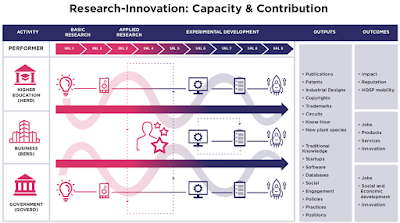In Canada needs a new approach to science, research to stay competitive, Robert Asselin does an excellent job of articulating the need for "The modern application of science and technology is the new frontier of economic competitiveness." This statement will alienate some who might prioritize the approach to publicly funded research outlined by Vannevar Bush in Science: The Endless Frontier, in which public funding was exchanged for autonomy to pursue basic research. Applied research and experimental development were thought to emerge naturally from market-facing actors who would create value from the fruits of basic research as they realized a vague downstream potential. That was good when this was first articulated in the 1945. But as Asselin points out "The arms-length science model we adopted after the Second World War does not provide an adequate framework for today’s economic paradigm."
As Asselin says, "the road to innovation is long and hard," and it requires us to think and act in new ways. This means being intentional about creating and protecting intellectual property (IP), and helping to foster collaboration across the public and private sectors. Below I've put a logic model that outlines such an approach, reposted from earlier.
And we have successfully piloted this model in Toronto as part of an orchestrated COVID-19 response where the 8 colleges and universities in Toronto worked together to support City of Toronto research priorities. eCampusOntario is supporting all of our 53 members to bring this model to fruition across the province.
Watch this space for more, but in the meantime, read this article. And while you are at it, check out this one From Dan Breznitz and Daniel Trefler.
 |
| An Integrated Model for Intentional Innovation: From Idea to Impact |

